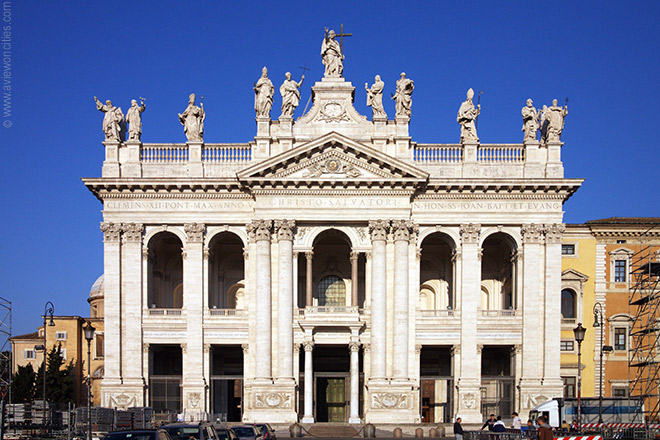To appreciate the importance of today’s liturgy we have to imagine ourselves at Mass 1800 years ago. We’re in Rome, not our local parish, and not a church, but just another house in the neighborhood. There are no parishes anywhere. Anywhere in the world. Just Christians gathering in houses for Mass. We’re not celebrating by daylight, but by candlelight. The windows are covered so that no one can see what we’re doing, and the door is being guarded to make sure no one catches us by surprise. Roman soldiers smash down the door, and they drag everyone outside at sword point and take you to one of those old statues you see in museums, but it’s all brand new and shiny, with an altar in front of it, and incense burning. And they point to that big stone statue and point their swords at you and say, “worship that, that’s a god, or we’ll hurt you and take away everything you own. And then don’t every celebrate a Mass again. It’s your choice.” You know that’s not right, you know that statue is not God, and you refuse, so they take you away in chains with your family.
That’s not just a story; it happened to Christians all over the world for almost two hundred years. And we’re celebrating today when it came to an end. Today we’re celebrating the dedication of the first parish in the whole world: St. John Lateran in Rome, which is the parish of the Holy Father, the Bishop of Rome. It was dedicated in 324 as the first place where Christians could publicly worship in the West without having to be afraid of losing their property, their family, and their lives, after almost two hundred years of having to get together and worship in secret for fear of getting arrested. That parish became the first parish of the diocese of Rome, and if you go to the big church that’s built there today, you see written on its columns that it is “the mother and head of all the churches of Rome and the world,” which is why we’re celebrating its dedication throughout the world today.
Ezekiel in the First Reading today is having a vision from God symbolizing the importance of that church. Ezekiel was in exile with the Israelites after they had been conquered and their Temple destroyed. In his vision, God shows him a new Temple to come, from which will flow a water that makes all sorts of good things grow and thrive, so that those good things can refresh and heal. That water is the grace of God that has flowed from Christ, to the apostles and their disciples, and to the Church for all of mankind for thousands of years, all over the world. We can’t see grace with our eyes, but we can imagine how pure and clean it is when we imagine that water flowing from the Temple, and how it always has big beautiful fruit trees near it, with medicinal leaves, wherever it flows. That water, like grace, can wipe away anything. It can quench any thirst. It can heal any wound. It can water any plant. But it takes faith to drink it, which is why we learn more about our faith every time we prepare to receive a sacrament, because every sacrament gives us another drink of grace.
Jesus in the Gospel today get’s mad at people in the Temple who are doing things that make his Father’s house more like a mall than a place to worship God. The Jews had to pay Temple taxes with money minted by the Temple – no foreign money was allowed. So the money changers were there to give people money minted by the Temple in exchange for foreign money. The Jews came to sacrifice animals to God, so they sold animals there as well. And all that business was turning the Temple into one big mall. And that hurt God, because people forgot about him. The people in charge of the Temple were angry with Jesus because he did what they didn’t do. So they asked him for a sign, like the prophets used to do, to prove that what he was doing was God’s will.
So, like a prophet, Jesus promised them a sign, a big sign, but one you could only understand if you believed in him: the Resurrection. They didn’t understand it until after the Resurrection, and the disciples didn’t understand it either. Jesus said the sign was “Destroy this temple and in three days I will raise it up.” They were thinking of that big building, but he was talking about himself. Destroying the temple was his death, and raising it up was his Resurrection. So if Christ was the first temple, if we want to be like Christ, we have to be temples too. So to show that we are temples of the Holy Spirit, we have to drive out everything in our heart that would make it hard for people to see that we’re Christians, to see that we’re temples of the Holy Spirit: we don’t sell out who we are or what we believe for money, we don’t hide who we are for fear of what others will say, and we always put God first, and don’t worship anyone or anything else.
Let’s thank God today for keeping us alive and healthy through his grace, and pray that the water of grace may flow everywhere in the world. Let’s pray for the Church throughout the world, especially in those places were Christians still have to gather and worship in secret for fear of death or arrest. Finally, let’s promise to show everyone that we are temples of the Holy Spirit by living holy lives.
Readings: Ezekiel 47:1–2, 8–9, 12; Psalm 46:2–3, 5–6, 8–9; John 2:13–22.


